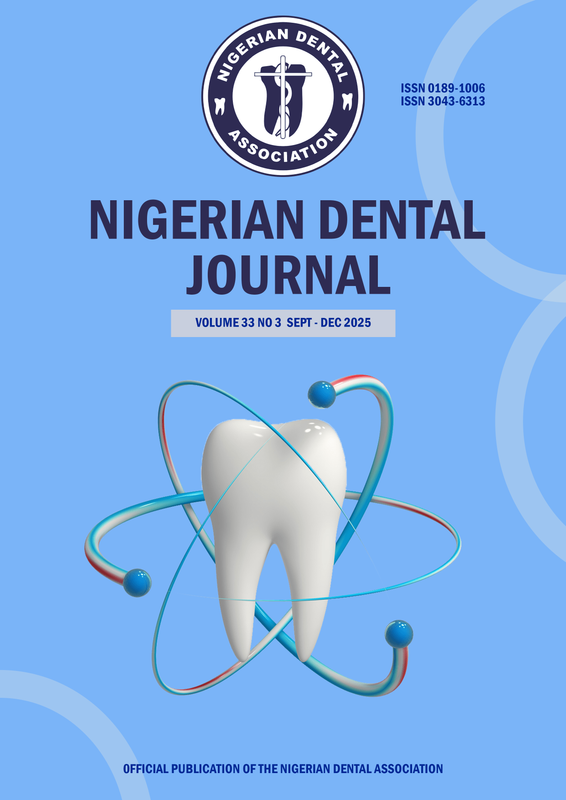Developing a Traditional Oral Health Education Folktale for Primary School Pupils in Ibadan, Oyo State, Nigeria
DOI:
https://doi.org/10.61172/ndj.v31i2.226Keywords:
Oral Health Education, Diet, Hygiene, Dental Clinic Attendance, Folktales, PupilsAbstract
BACKGROUND: Worldwide oral diseases are a major public health problem among children. Oral health education directed at major aetiological factors such as diet, oral hygiene and dental clinic attendance has helped to reduce the burden of oral diseases in children. Folklore, which includes folktales, puppet shows, dramas, folk music, and dance, appears to be a promising tool that could gain and engage young people's interest. Traditional folktale in school-based health education in Nigeria has not yet undergone much research or evaluation.
AIM: This paper aims to report how a local traditional folktale for oral health education among primary school pupils was developed with a view to providing information on how the folktale can be developed in other languages as well as how other oral health education folktales can be developed.
METHOD: Oral health professionals, linguist and theater arts experts from the University of Ibadan, Nigeria, developed a traditional folktale represented on a graphically designed banner (comic strips) for use as an oral health education tool for primary school pupils. Developing the tool involved certain processes which were validated and evaluated at every step. These processes included developing oral health messages on adequate dietary and oral hygiene practices as well as good dental clinic attendance. The messages were used to develop a folktale using improvisation circle method.
RESULTS: A banner of 6 feet by 4 feet containing graphically designed illustrations (comic strips) of the traditional folktale was developed. The message of which was basically diet, oral hygiene and dental clinic attendance instructions aimed at improving the attitude and practice of primary school pupils in Ibadan to oral health. The folktale was primarily developed in English language, the official language in Nigeria, then translated to Yoruba, the indigenous language of the people of Ibadan. Many skills such as team-building, effective communication and leadership were developed from the many phases and meetings required in the development of the folktale.
CONCLUSIONS: The early years are the formative years. Hence developing a tool to improve the oral health education of children using traditional folktale is a valuable and culturally advantageous project which has substantial future potentials.
Downloads
References
Jain N, Dutt U, Radenkov, Jain S. WHO's global oral health status report 2022: Actions, discussion and implementation. Oral Diseases 2023. https://doi.org/10.1111/odi.14516.
Bastos LF, Hugo FN, Hilgert JB, Cardozo DD, Bulgarelli AF, Santos CMD. Access to dental services and oral health-related quality of life in the context of primary health care. Braz Oral Res. doi: 10.1590/1807-3107bor-2019.vol33.0018.
Oral health. World Health Organization. 2023. https://www.who.int/news-room/fact-sheets/detail/oral-health
Stein C, Santos NML, Hilgert JB, Hugo FN. Effectiveness of oral health education on oral hygiene and dental caries in schoolchildren : Systematic review and meta-analysis. Community Dent Oral Epidemiol. 2018; 46(1):30-37.
Patel J, Hearn L, Gibson B, Slack-smith LM. International approaches to Indigenous dental care : what can we learn ? Aust Dent J. 2014; 59(4):439-345.
Jibo, AM. Oral hygiene knowledge habits and practices among primary school pupils in Kano Nigeria. Jos J Med. 2018;12(2):72–83.
Werner H, Young C, Hakeberg M, Wide U. A behavioural intervention for young adults with dental caries, using acceptance and commitment therapy (ACT): Treatment manual and case illustration. BMC Oral Health. 2020;20(1): doi. 10.1186/s12903-020-01213-4.
Lagu AMHR, Thaha RM, Syafar M, Hadju V, Kurniati Y. Using Games to Promote Healthy Behavior in Children : A Narrative Review. Open Access Maced Sci. 2022;10(E):1904–1910.
Ibiyemi O, Lawal F, Osuh M, Owoaje T, Idiga E, Fagbule O, et al. Developing an Oral Hygiene Education Song for Children and Teenagers in Nigeria. Int Dent J. 2022;72(6):866–871.
Morrow LM. Retelling Stories: A Strategy for Improving Young Children’s Comprehension, Concept of Story Structure, and Oral Language Complexity. Elem Sch J. 1985;85(5):647–661.
Lever R, Sénéchal M. Discussing stories: on how a dialogic reading intervention improves kindergartners’ oral narrative construction. J Exp Child Psychol. 2011;108(1):1–24.
Lawal FB, Fagbule OF, Akinloye SJ, Lawal TA, Oke GA. Impact of oral hygiene habits on oral health-related quality of life of in-school adolescents in Ibadan, Nigeria. Front Oral Health. 2022;9(3):979674: doi: 10.3389/froh.2022.979674.
Akinyamoju CA, Dairo DM, Adeoye IA, Akinyamoju AO. Dental Caries and Oral Hygiene Status: Survey of Schoolchildren in Rural Communities, Southwest Nigeria. Niger Postgrad Med J. 2018;25:239–245.
Meherali S, Punjani NS, Mevawala A. Health Literacy Interventions to Improve Health Outcomes in Low- and Middle-Income Countries. Heal Lit Res Pract. 2020;4(4):e251–266.
van Palenstein Helderman WH, Munck L, Mushendwa S, van't Hof MA, Mrema FG. Effect evaluation of an oral heaifh educafion programme in primary schools in Tanzania. Community Dent Oral Epidemiol. 1997;25(4):296–300.
Nakre PD, Harikiran AG. Effectiveness of oral health education programs: A systematic review. J Int Soc Prev Community Dent. 2013;3(2):103–115.
Chua H, Sardana D, Turner R, Ting G, Ekambaram M. Effectiveness of oral health education methods on oral hygiene in children and adolescents with visual impairment: A systematic review. Int J Paediatr Dent. 2021;31(6):724–741.
Habbu SG, Krishnappa P. Effectiveness of oral health education in children - A systematic review of current evidence (2005-2011). Int Dent J. 2015;65(2):57–64.
Bermont G. 2013. Working with(out) a net: Improvisational theatre and enhanced well-being. Frontiers in Psychology 2013; 4: 929-935.
Tang SX, Sealaus KH, Moore TM. 2020). Theatre improvisation training to promote social cognition: A novel recovery-oriented intervention for youths at clinical risk for psychosis. Early intervention in Psychiatry. 14(2):163-171.
Resources for educators. The Kennedy Center. (https://www.kennedy-center.org/education/resources-for-educators/classroom-resources/lessons-and-activities/lessons/6-8/writing-folktales/)
Downloads
Published
Issue
Section
License
Copyright (c) 2023 Olushola Ibiyemi, Iyanuoluwa Ajayi, Adetola Babalola, Oluwatosin Giwa, Gbenga Oyebode, Amusa Folakemi, Ooreoluwa Ade-davies, Francis Fagbule, Chukwuma Okoye

This work is licensed under a Creative Commons Attribution 4.0 International License.
Open Access Statement
- We became fully Open Access since January 2023.
- Our new and archived materials are available free of charge on open basis and under a Creative Commons license as stated below.
Copyright statement
Copyright © 1999 The authors. This work, Nigerian Dental Journal by Nigerian Dental Association is licensed under Creative Commons Attribution 4.0 International License.

